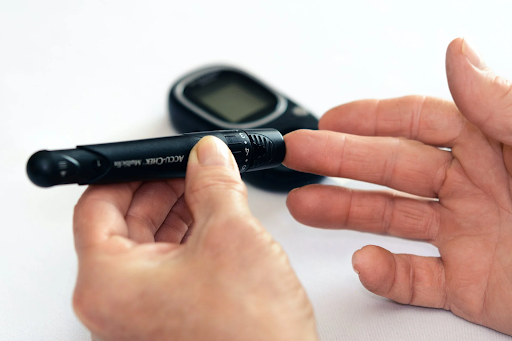It’s often overlooked, but individuals diagnosed with type 2 diabetes are more susceptible to other health issues such as cardiovascular disease, nerve damage, hearing impairment, and more. People with diabetes are also more likely to be diagnosed with sleep apnea, which can exasperate their symptoms — especially because the individual’s sleep apnea often goes undiagnosed and untreated! Sleep apnea can cause a person with diabetes to experience more severe symptoms when left untreated, resulting in more significant health risks.
Follow along as ApneaMed uncovers the connection between sleep apnea and type 2 diabetes to ensure your patients can successfully diagnose, treat, and manage their condition.
What Is Sleep Apnea?
Obstructive sleep apnea is a sleep disorder that causes an individual to experience multiple breathing disruptions throughout the night. These disruptions occur when the soft tissues in the individual’s throat collapse and cause a blockage of the passageway, causing the patient to stop breathing until their body can reopen the airway.
As a result, the individual often snores, gasp for air, or chokes in their sleep in an attempt to reopen the airway. Usually, the individual is unaware of the breathing disruptions until a partner encounters their snoring or choking.
When left untreated, sleep apnea can lead to various health conditions, including stroke, cardiovascular disease, hypertension, obesity, diabetes, and more. Individuals diagnosed with diabetes have a 50-50 chance of simultaneously being diagnosed with obstructive sleep apnea.
The Connection Between Type 2 Diabetes and Sleep Apnea
Those diagnosed with type 2 diabetes need to carefully manage their condition to ensure their body produces enough insulin to operate at peak performance. Because sleep apnea impacts an individual’s sleep quality, it can wreak havoc on a patient’s ability to manage their condition successfully.
Although the individual may think they’re getting a full night’s sleep, their cessations in breathing lower their quality of sleep. This leads them to feel unrested and fatigued throughout the day. When a patient feels lethargic, it can cause them to feel unmotivated to take care of themself properly. Without enough energy, the individual is less likely to prepare healthy meals or get exercise, leading to additional problems like obesity. By struggling to get a good night’s sleep, diabetic individuals may forget their diabetes medication or adequately monitor and manage their insulin.
The Importance of Sleep Apnea Testing
If a patient with diabetes is exhibiting sleep apnea symptoms, such as frequent headaches, snoring or trouble breathing while sleeping, or lethargy and daytime sleepiness, they should receive a sleep assessment.
A home sleep study is more affordable and less time-consuming than a standard sleep study. The individual will receive the home sleep test and instructions on administering an overnight unattended sleep study. While sleeping, the device will record the patient’s blood oxygen levels, heart and breathing rates, and how often their body moves blood oxygen saturation.
Following the self-administered test, the results will be analyzed by one of ApneaMed’s board-certified sleep physicians. They will provide a recommended treatment for sleep apnea, which will help the management of diabetes. Standard treatment is the use of an automatic positive airway pressure machine, otherwise known as APAP. A CPAP machine uses self-adjusting air pressure to keep the individual’s airways open while sleeping, thus helping with sleep apnea while also helping to improve blood sugar levels and improve diabetic conditions.
If sleep apnea is left untreated in a patient with diabetes, their symptoms can worsen over time and lead to the development of type-2 diabetes.
Contact our team to learn more if you have any questions about ApneaMeds’ at-home sleep apnea test or our sleep apnea treatment equipment.

